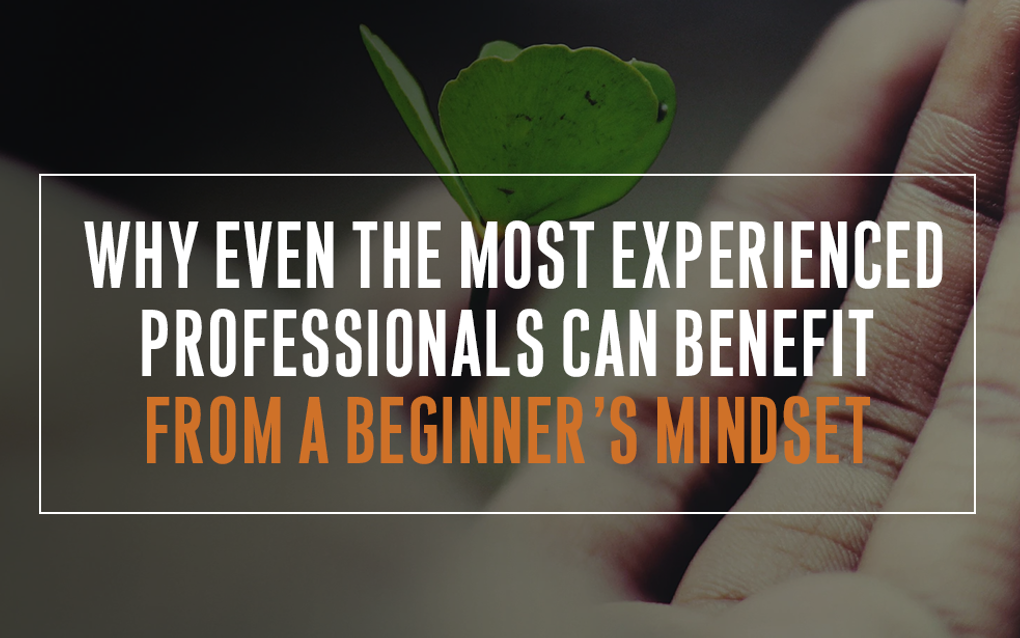Beginner’s Mind in the New World of Work

“Yikes. I have no idea what I’m doing.” That’s often the first thought when we embark on something new — whether it’s a location, place of employment, or skill. The anxiety of unknown challenges and experiences often impedes our career success. This anxiety often leads to avoiding the situation altogether and to behavioral inertia that can stunt both career and personal development.
What to do? There’s a counter-intuitive advantage true to almost all fulfilled innovators that my team and I have both researched and worked with: Open up to what you don’t know instead of pretending to know it all.
That advantage? Think like a beginner and get curious.
The beginner’s mindset and a curious demeanor are powerful tools when it comes to combating situational anxiety and avoidance. It involves looking at events without preconceptions and judgments, focusing on the prospect of learning and growth instead of negative emotions. Even for those who reach a high level of success in their field, there are many benefits to adopting a beginner’s mindset when facing unprecedented challenges.
Personality traits like neuroticism (the tendency to overanalyze things) and openness to new experiences can play a big part in determining avoidance. People high in the former and low in the latter view these opportunities as dangerous, discounting positives like growth and learning experience.
Some people are, for whatever reason, more prone to these traits than others, but nearly everyone experiences them at some point or other — especially when it comes to the professional arena.
Beyond the Peter Principle
We’ve noticed that as people progress throughout their careers, they naturally want to appear more competent, not less. And this is especially true for people wanting to get promotions. Unfortunately, the Peter Principle, which states that employees rise to their level of incompetence, is turning out to be more than just a joke.
Data demonstrates that people are often promoted despite lacking the skills necessary for their new position. But, by adjusting how we relate to growth and development, it’s possible to overcome both the Peter Principle and the more general aversion to learning on the job.
Leaders and managers, like their workers, need to keep in mind that aversion to growth is a natural feeling, but workers and leaders alike can learn to train their minds to foster a more productive emotional response.
In the same way that learned optimism is important to success across many of life’s most challenging domains, embracing the curiosity of a beginner’s mindset is essential to becoming more productive, agile, and engaged in the era of constant disruption.
Curiosity: The Beginner’s Edge
In previous decades, it might have been possible to advance through one’s career without facing major disruptions to workflow, processes, and industry best practices. But exponential development within tech and global disruptions like the pandemic now mean that change is constantly occurring at a massive scale.
Where a wealth of experience and rigorous conscientiousness were crucial to success even just a few years ago, the economic landscape is quickly shifting to prioritize those agile individuals who can learn quickly. Curiosity, versatility, and an endless drive to learn are now some of the most important qualities for success in this new world of work.
That’s right: Not knowing, in the right ways, can be advantageous.
The Beginner’s Mindset helps leaders, managers, workers, and entrepreneurs alike stay nimble, especially through mindful tasks such as deliberate practice, repetition without repetition, and other important cognitive exercises. Deliberate practice, a methodology often used in technical domains like sports, refers to training routines conducted systematically and with purpose. Repetition without repetition simply refers to behavioral flexibility — the ability of an individual to transfer skills from one domain to another. Those who embrace the beginner’s mindset are able to leverage these practices to quickly gain proficiency, and even mastery, in fields where they have little experience.
Across different industries, disruptive methods and technologies are creating the need to constantly learn — curiosity helps ensure that people are ready to succeed in the future of work.
Riding Curiosity into Hybrid Work
As we move forward in this pandemic era, the most valuable talent will of course come with a knowledge base and skill set in their domain – but they will come with an even more invaluable asset: the ability to know what they don’t know and have the flexible cognitive muscles to ask good questions, keep learning, and collaborate with others based on shared humility instead of arrogance.
Since 2020 alone, professionals, entrepreneurs, and creatives across different backgrounds have had to adjust their preferred workflows to fit with a landscape of rolling lockdowns and remote work.
Work from home can feel both liberating and burdensome all at once. The benefits of no commute, spending more time around family, and flexible work hours are offset by the cognitive demands of numerous new software platforms and increasing burnout. There’s certainly no replacing the experience of meeting up with coworkers and friends in the office, but curiosity can help offset many of the reported deficits of remote work — from increasing experiences of wonder and awe to reducing WFH-related burnout.
Wonder Interventions@Work
If you’re ready to move with more curiosity into the unknown with a rejuvenated sense of curiosity and resilience, Tracking Wonder is a stepping stone to working well without burning out in a culture of toxic productivity.
If you’re curious about how we can work with you and your team, complete our short Wonder@Work Questionnaire so we can get to know you and your organization better.
Gain free tools and perspective here to help you stay open to what’s possible.
The latest book from team culture consultant and Tracking Wonder founder Jeffrey Davis will also help you cultivate creativity, build better relationships and uncover meaning in an increasingly uncertain landscape. Follow this link to order your copy of Tracking Wonder and renew your experience with this one life.